Dear Friend,
I hope you had a good week-and-a-half.
If this is your first letter from me, welcome! I’m really happy you’re here.
If you read my last few letters, you will know about the commitment I made to have a ‘Protestant January’ — a first month of 2024 characterised by a return to routine, sensible choices, nutritious and dull vegetables and an industrious commitment to admin.
My success in this regard has been partial, at best. Two weeks ago I went on a press trip the French Alps and last weekend I went to a wine festival (a little more about that below). Still, in contemplating the Protestant life, that is the un-lascivious, non-showy, non-earnest life, I spent some time reflecting on turns of phrase we only use in the UK, and what these reveal about my people. Some examples:
Euphemistic verbs of motion. I have been thinking about how in the UK, much of the time, we can’t simply use the word ‘go’ to describe our movement, especially when we are in the company of someone else. We have to POP (“pop to the shops”) or NIP (“I’ll just nip out”) or DASH or even RUN. We can’t simply go from A to B wholeheartedly and without shame. And if we’re going to leave someone’s company, we have to make it very clear that we will be moving to our destination in a way that is unimportant, inconsequential and so fast as to be almost imperceptible.
See also GRAB, as in ‘I’ll just GRAB my coat’ (wouldn’t want to be so bold as to GET your coat!).
MENDING: A very modest word for to describe repairing something. It goes hand in hand with ‘making do’.
Verbs of complaint like GRUMBLING or WHINGEING implying that the act of complaint is bothersome to others. A British person might use these to minimise the inconvenience of things like physical pain, bodily needs or a failing economy and political system.
See also A FUSS — something not worth making unless perhaps you are at this moment dying
BOTHER (verb) — as in ‘I have only lost feeling in ONE of my legs. I won’t bother the doctor’
FAFFING AROUND An American friend of mine uses this to describe what I would describe as ‘pottering’ — a harmless, even enjoyable time spent doing things of not pressing importance…as an American it is hard for her to grasp that the word FAFFING is implicitly shame-laden, it implies taking your time in a way that is irresponsible and over-indulgent, selfishly inconveniencing those around you. It is not desirable to faff!
BUNG it in - a replacement for ‘put’ that implies less pomposity than using the verb ‘put’ straight out e.g. ‘then you just need to BUNG the casserole in the oven…’
“SNAPPER” - a British editor recently said this to me to mean ‘photographer’. Because to simply come right out and say ‘photographer’ would be wildly pretentious, as if he thought he was a Nouvelle Vague director or something. No, safer to stick with ‘snapper’
Language around justifying going to the toilet — I read this list aloud to an American friend who is married to a British person and asked if I had missed anything. She commented that she’s noticed British people always excuse themselves to go to the toilet in elaborate and sometimes graphic fashion e.g. “I’m BURSTING for a wee”. She thought this was vulgar as compared to, for example, “I’m going to the bathroom/restroom”. I thought about it for a moment and realised that this custom again comes down to justifying why you are leaving your companion alone. When you say “I’m desperate for the toilet”, the subtext is: “if I simply had a normal bodily urge to use the toilet, that would not justify the rudeness of leaving the conversation momentarily, so I need to dial up the stakes here so that it is not AS rude for me to abandon you ”. (The irony is, many of us find conversation so tiring that the other person’s trip to the toilet is a welcome reprieve).
We are a strange people.
Red wine and grievances
Last weekend I was in Burgundy — specifically Dijon and the surrounding countryside — visiting a wine festival called the Saint-Vincent Tournante, which was first held in 1938. The festival takes place in different Bourgogne villages each year and this year it was neighbouring Morey Saint-Denis and Chambolle-Musigny. For the occasion, these teeny villages (populations of less than 1000) were festooned with decorations: red and yellow flowers made with crepe paper dotted in trees, huge wall collages depicting giant grapes, and some glamorous looking lady-scarecrows.
We had pre-ordered festival ‘kits', which consisted of a little cloth ‘wine pouch’, designed to hang comfortably around the neck while housing a wine glass (which was also included). We were given a numbered map of the site and a corresponding set of 8 tickets, each one exchangeable for a glug of a different wine.
Both of the villages are located along the Route des Grands Crus (‘the Road of Great Vineyards and their Great Wines’) and we walked from one to the other flanked by rows and rows of dormant winter vines.
Though the event centred around alcohol, the overall feel was bon enfant, as the French say (sort of harmless and in good humour). There were a lot of customs and ceremonial things going on, not all of which I understood but all of which I enjoyed. Some examples: an accordion duo playing olde-worlde tunes while couples of mostly elderly villagers did perfectly coordinated dance routines; little figurines of saints (including Vincent himself) carried atop people’s shoulders on wooden stands; a lot of ceremonial costumes and sceptre-type things; some merry ancestral-seeming drinking songs.
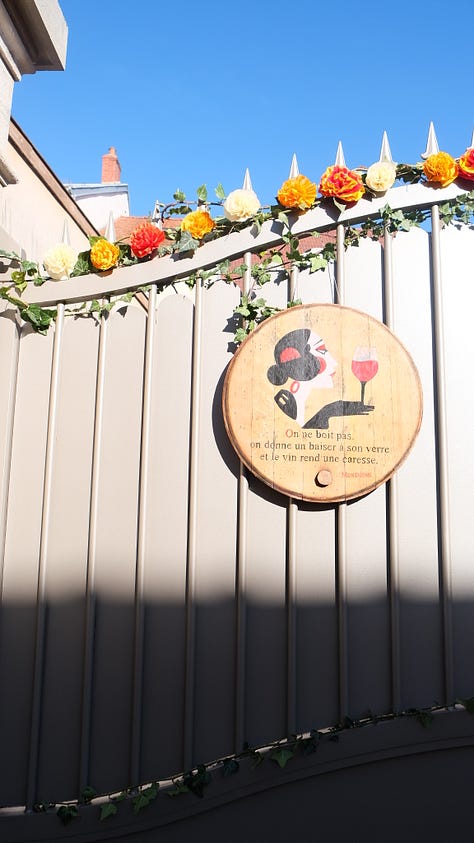
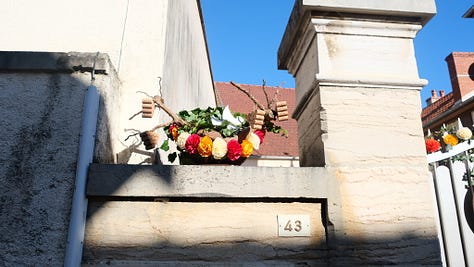
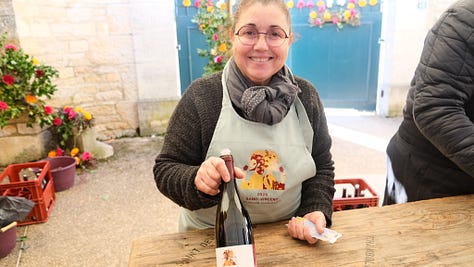
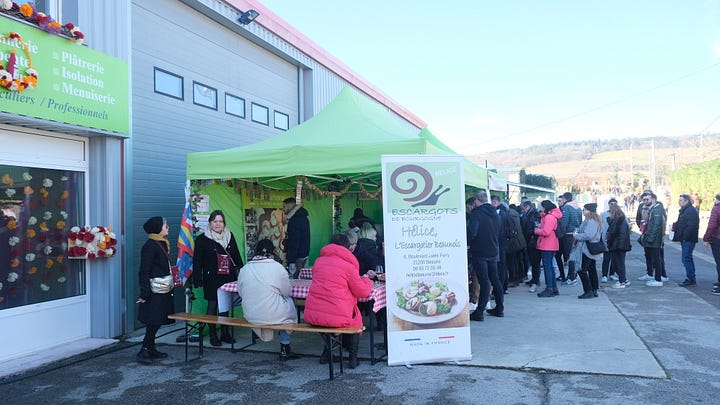
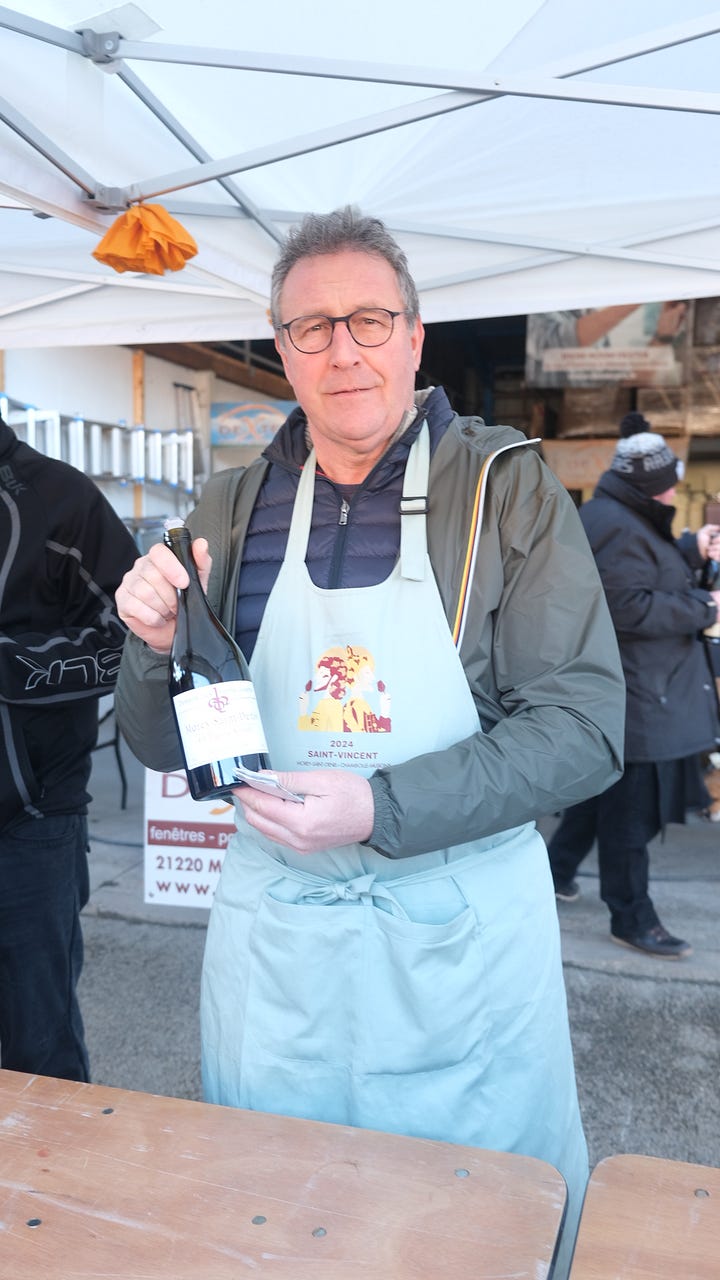


It felt a world away from Paris. An entirely different kind of France, and the contrast between capital and countryside is front-of-mind at the moment.
****
When we left for Dijon on Friday, our driving route was diverted due to a flotilla of angry farmers blocking the motorways south-east of Paris with big blockades of tractors, part of an ongoing movement that’s been taking place across the country for the last several days. In other parts of France, the protestors have also added hay bales, rotten fruit and vegetables, and even herds of goats to their blockades.
This fronde d’agriculteurs (uprising of agricultural workers) is the culmination of many years of grievances among large parts of the French farming industry. In particular, farmers are angry about their inflation-squeezed margins, EU environmental policy and how the ensuing regulations are administered in France, excessive bureaucracy, as well as a more general feeling that city dwellers do not understand or respect what they do.
The movement has been led by a huge farming union called the FNSEA and another representing Young farmers (Jeunes agriculteurs). The first protests began in rural communities, in particular in the Lot-et-Garonne department in the southwest of France and in the western Indre-et-Loire department, where newly-minted prime minister Gabriel Attal went to try and placate people on Sunday. Despite the 34-year-old standing among them awkwardly in a suit for several hours, the people didn’t seem too placated.
An early announcement of emergency state aid and a stand-down on a controversial fuel tax hike failed to quell the disquiet and protests continued this week, culminating in blockades around some of France’s biggest cities on Wednesday and Thursday, including Nice, Lyon and Paris.
Gérald Darmanin, the usually hardline Interior Minister I mentioned in my last letter, was very reluctant to send police to take on the farmers, even as some protests involved vandalism and even fires. This is an indicator of how much power the agricultural sector has in France. The conservative Darmanin usually does not hesitate to send in police, including weapon-bearing riot police (CRS) to other protests against, for example, institutional racism, or even to control crowds — he defended the use of tear gas on Liverpool F.C. fans in a chaotic incident at the Stade de France in 2022; he also controversially entirely banned protests in support of Palestine during the first weeks of the Israel-Hamas war.
When it comes to the farmers’ unions, however, the minister consistently maintained that he would not send police to control the protests, even as roads were shut down and major traffic disruption caused. Police were only deployed when some smaller protest groups moved into Rungis, the huge wholesale food market outside of Paris, late last night. Some striking pictures show a line of tractors facing off a line of armoured police vehicles.
The protests were finally called off later in the day on Thursday when Attal announced a further raft of funding and measures, including the ban of imports treated with pesticides that French farmers are not allowed to use.
I wrote last year about the political importance of French farmers in the context of the yearly Salon de l’Agriculture event, which is coming up at the end of this month. The unions involved in this particular protest are particularly powerful and have a reputation for being on the conservative side of the political spectrum.
The anti-Brussels, anti-big-business thrust of this movement is of course a boon for the National Rally (the artist formerly known as the National Front), whose representatives, such as young leader Jordan Bardella, have also been making their own visits to farms and adding their angry voices to the fray.
But France’s population of some 700,000 farmers is far from homogenous. I watched a debate on French television last week that pitted farmers against ecologists/greens. Many among the speakers rejected the dichotomy. Green politicians and activists suggested — and many of the farmers present agreed — that there was no future for farming without biodiversity and environmental protections, while many farmers argued they cared deeply about the land and animals, but were drowning under the weight of financial strife and administration. The statistic was cited that one agricultural worker in France dies every two days from suicide, representing a proportion of death by suicide significantly higher than in other professions.
All the guests on this debate show were united in their anger against the big fish, such as supermarket giants, who continue to make record profit amid inflation, while the farmers margins get squeezed, the consumer prices rise and the ecological damage keeps coming.
Thirty-second book club
Staying on the theme of rural France…I have been slowly making my way through one of my Christmas presents, an edition of the 1989 best-selling memoir A Year in Provence by Peter Mayle, featuring watercolour illustrations by Paul Hogarth.
The classic book, which I haven’t read before, tells the tale of Mayle moving to Ménerbes in the Luberon mountains. Reading up around the author, a former ad industry creative, I learned that in the end he had to leave his chosen village because, following the success of his book, there were too many international tourists coming to see where the dream was made.
The same theme in a different guise popped up again this week for me when I was commissioned to write about the ire of locals in the part of the Latin Quarter where Emily in Paris is filmed. I include a little snippet of my article for The Times below and a link. (Let me know if you would like me to send you the full version!).
Read the article
I also appeared on Irish radio station Newstalk talking to broadcaster Pat Kenny about the same subject. You can listen to that here. Disclaimer: I am not sure why I said the word ‘indeed’ quite so many times.
Thank you for reading and for being my pen friend! I hope you’ll forgive this letter being a bit off-schedule. I will write again on Sunday with some more updates from Paris, including a surreal virtual reality (VR) tour of Notre-Dame I took.
Please ‘like’ and share this letter if you do like it.
Have a good end of week!
Yours,
Hannah




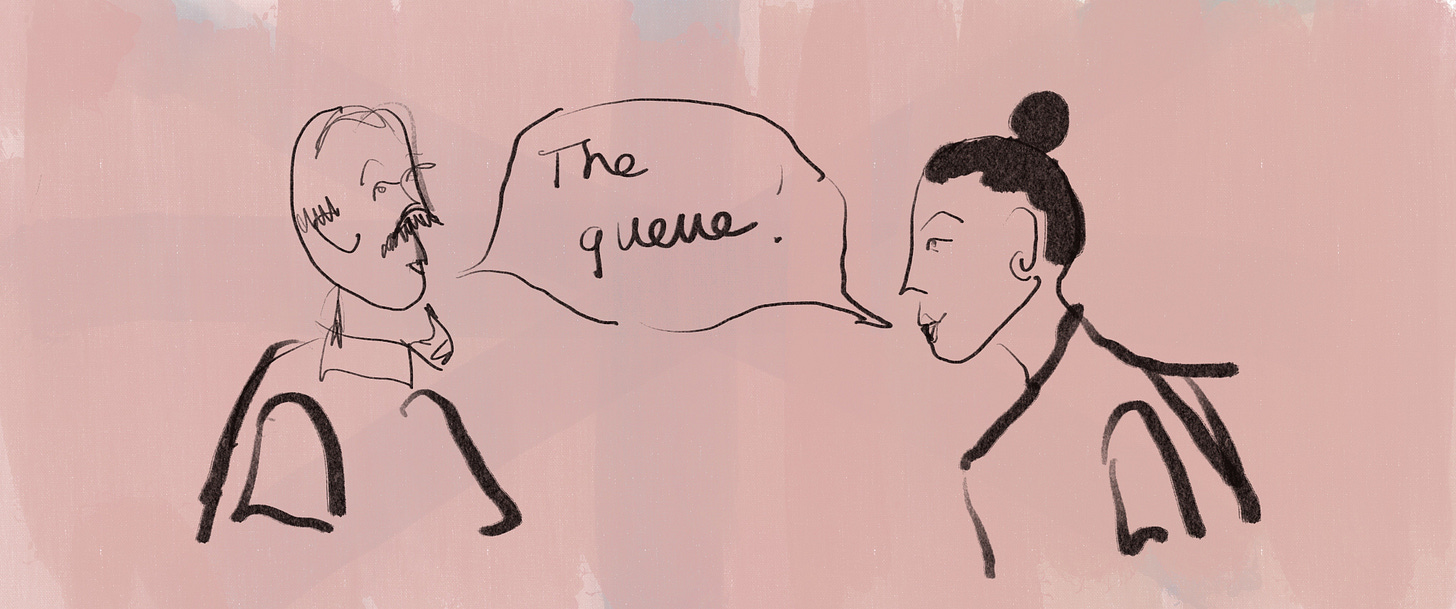

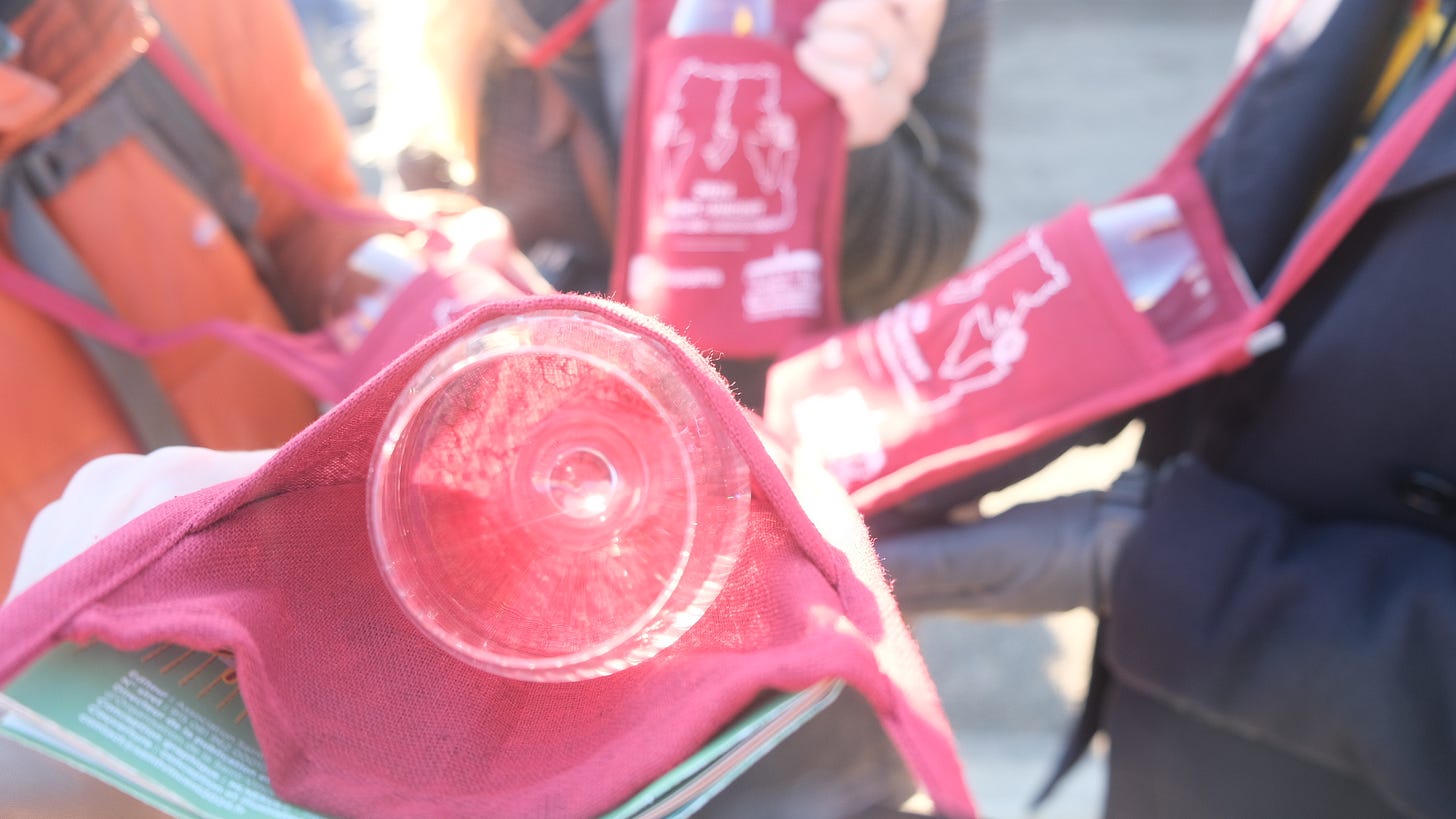

I love the British euphemisms list!! I use “bung” all the time. And it never occurred to me to think about why we use these words, I think you’re so right! But although I really enjoy the directness found in some other cultures I don’t think I could change over.
Your vocab list is perfect. I too often announce "I'm desperate for a wee!" before scuttling to the toilet in a manner that suggests imminent disaster, even if the truth is that I'm at least an hour away from that being a concern. I didn't realise until today that it's because I'm trying to be polite, but you're absolutely right.